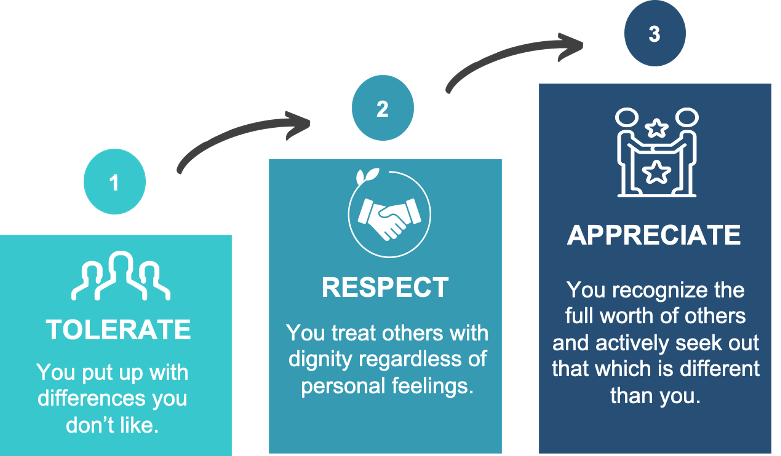Why Being Polite and Professional is a Start, but Not Enough

“I’m an inclusive leader. I’m polite and professional to everyone.” I hear that a lot in my line of work. But here’s the thing: being courteous doesn’t equate to inclusivity. To explain what true inclusive leadership is, I’d like to introduce the Inclusion Spectrum.
Tolerance: Acknowledging Differences
At the bottom of the Inclusion Spectrum lies Tolerance. Tolerance is the willingness to put up with differences we may not agree with or like. It’s the baseline where differences are acknowledged, albeit superficially. A tolerant workplace may appear polite and professional, but it often lacks genuine engagement with diversity. Picture a meeting where diverse perspectives are acknowledged but not fully considered. For example, when someone presents a dissenting viewpoint, and the response is simply, “Thanks for your input, but we’re sticking with the original plan.” While no one is overtly disrespectful, the lack of genuine consideration for diverse views leaves individuals feeling unheard and undervalued. Because diverse viewpoints are not fully explored, decisions are often prone to groupthink which prioritizes harmony and agreement over critical thinking, leading to suboptimal outcomes. Tolerance isn’t bad, but inclusive leaders strive have people feel more than just tolerated in their presence.
Respect: Treating Diversity with Dignity
Moving up from tolerance on the Inclusion Spectrum is Respect. Respect means treating diversity with dignity, regardless of personal feelings. In a respectful workplace, diverse perspectives are appreciated even when they are unpopular, disliked, or challenge the status quo. For example, during a meeting, if someone presents a differing viewpoint, a respectful response might be, “Let’s consider how that idea impacts our plan.” This approach recognizes the significance of diverse viewpoints and promotes an environment where everyone feels heard and respected. Even if the final decision remains unchanged, a respectful workplace strives to understand how diverse perspectives can contribute to the decision-making process.
Appreciation: Embracing Diversity as an Asset
The highest level of inclusion is Appreciation. Appreciation not only respects differences, but also recognizes diversity as a valuable asset needed to drive innovation, more thoughtful decisions and stronger outcomes. An attitude of appreciation for diversity means embracing viewpoints that might challenge our own and actively seeking alternative opinions, even if it takes extra effort. The key question to foster an appreciative team culture and truly inclusive meeting is: “Whose perspectives are we missing here?” Then, it’s about actively seeking out those diverse viewpoints and learning from them to make better decisions.
Here’s an example of appreciation in action – a client organization formed an employee-led Diversity, Equity, and Inclusion (DEI) council. Initially, only employees enthusiastic about DEI volunteered. However, the council leader recognized that this group didn’t represent the full spectrum of opinions on DEI within the organization. Consequently, she actively sought out individuals who were skeptical of DEI, employing a different approach to engage them. Through one-on-one conversations to build trust and garner buy-in, these skeptical individuals eventually joined the council. As a result, decisions became more thoughtful and balanced, leading to better outcomes that allowed DEI initiatives to resonate with all employees and gain traction.
The Path to True Inclusion
To achieve true inclusion, leaders must go beyond being polite and professional and strive for genuine appreciation of differences as an asset to make us better. This entails actively seeking diverse perspectives and adopting a flexible approach to incorporate them into decision-making processes. As inclusive leaders, our challenge is to challenge ourselves to embrace diversity that we may not agree with or dislike as a source of strength versus a threat. By doing so, we foster workplaces where everyone feels valued and empowered to contribute. Higher engagement, more thoughtful decisions and better outcomes will be the reward.
Let's Connect
Beth Ridley is a former corporate executive turned organizational transformation consultant, speaker and author. Beth combines 25 years of global leadership and management consulting experience with expertise in diversity and inclusion and positive psychology to partner with leaders to transform workplace cultures to better achieve their vision and goals. Beth’s work is featured in national publications and she frequently delivers keynotes and workshops at events around the world. Beth lives with her husband and three children in Milwaukee, Wisconsin.

